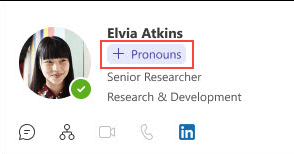Supporting Inclusivity in Our Communications at FBS
By b.isibor, on 7 September 2023
Sharing pronouns is a small but powerful gesture that can greatly impact how we communicate with and support our colleagues, friends, and acquaintances. Recently, Microsoft Teams introduced a new option for adding pronouns, reflecting the growing awareness of the importance of this practice. Additionally, individuals now incorporate pronouns into their UCL email signatures and social media profiles.
What Does it Mean to Share Your Pronouns?
Sharing pronouns means openly communicating how you would like to be addressed and referred to regarding gender. It’s a simple way to let others know how you identify and how you wish to be recognised. Whether you identify as transgender, non-binary, or cisgender, sharing pronouns is an act of respect and acknowledging the diversity of gender identities.

Why Might Someone Choose to Share Pronouns?
Putting pronouns on our email signatures and social media accounts can have a number of benefits:
- Expressing Identity: Trans and non-binary individuals can use shared pronouns to express how they would like to be addressed, ensuring that their gender identity is respected.
- Support and Solidarity: People who feel that their gender identity is already clear to others can use pronouns to show support for trans and non-binary colleagues, promoting an inclusive and affirming environment.
- Clarification: For those whose names do not immediately indicate their gender identity, adding pronouns can help colleagues address them appropriately, reducing potential confusion.
How Should I Use Information About Other People’s Pronouns?
Respecting and using someone’s preferred pronouns is essential. It shows that you acknowledge and validate their identity. However, mistakes can happen, and that’s okay. Correcting these mistakes should be done respectfully. If you make a mistake, apologise briefly and correct yourself without making it a big deal. For example, if someone prefers “they/them” pronouns and you accidentally use “he,” simply say, “I’m sorry, they.”
Do I Have to Add My Own Pronouns?
No. There are also reasons why adding pronouns to our communications might not be appropriate for some colleagues – now or ever.
- Not Ready to Share: Some people might not be ready to disclose their true gender identity to colleagues, and that’s perfectly okay. Respecting their privacy is paramount.
- Undecided Preferences: Others may still be exploring their gender identity or may not have strong preferences. Forcing them to declare pronouns can be stressful and counterproductive.
To sum up, sharing pronouns is a simple yet impactful way to promote inclusivity and respect in our interactions. It allows individuals to express their gender identity, supports their trans and non-binary colleagues, and helps clarify ambiguous situations. Respect and understanding are at the core of this practice, and it’s perfectly acceptable if someone chooses not to share their pronouns for personal reasons. The key is to create an environment where everyone’s gender identity is acknowledged and respected.
Written by Prof Carolyn McGettigan, LGBTQ+ Equity Lead.
 Close
Close

